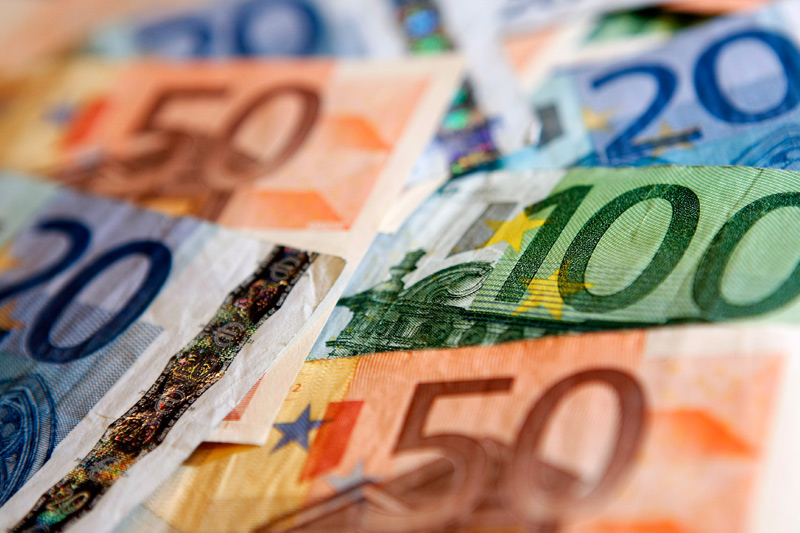Investing.com - The euro slipped lower against the other major currencies on Wednesday, amid investor jitters ahead of the European Central Bank’s keenly anticipated policy meeting on Thursday.
During European late morning trade, the euro was weaker against the U.S. dollar, with EUR/USD sliding 0.18% to 1.2543.
Demand for the single currency was hit by growing doubts over whether the ECB will announce more details of measures to help stabilize the region’s sovereign debt markets after its policy meeting on Thursday.
Meanwhile, a report showing that service sector activity in the euro zone contracted at a slightly faster rate than initially estimated in August added to fears that the bloc is set to enter a technical recession in the third quarter.
Markit said that its revised services purchasing managers’ index ticked down to 47.2 in August from a preliminary reading of 47.5, defying expectations to remain unchanged.
Germany's services sector contracted at its fastest rate in three years, with the PMI coming in at 48.3.
A separate report showed that retail sales in the bloc fell 0.2% in July, in line with expectations, bringing the annualized rate of decline to 1.7%.
The single currency was also lower against the pound, with EUR/GBP down 0.27% to 0.7896.
The pound remained supported after stronger-than-forecast service sector data for August fuelled hopes that the Bank of England would refrain from implementing further stimulus measures at its policy meeting on Thursday.
The euro was down against the yen, with EUR/JPY shedding 0.21% to trade at 98.35 and remained almost unchanged against the Swiss franc, with EUR/CHF inching up 0.02% to 1.2013.
The Swiss franc was little changed after official data showed that consumer price inflation in Switzerland was flat in August, compared to expectations for a 0.1% increase.
The shared currency remained supported against the Australian, New Zealand and Canadian dollars, with EUR/AUD rising 0.22% to 1.2316, EUR/NZD inching up 0.03% to 1.5820 and EUR/CAD edging up 0.05% to 1.2395.
The Australian dollar weakened after official data showed that the country’s gross domestic product expanded by 0.6% in the second quarter, disappointing expectations for growth of 0.7%, following a 1.4% expansion in the three months to March.
Also Wednesday, Germany's Finance Minister Wolfgang Schäuble said the euro zone would be more stable in 2013 and added that the bloc would still exist in the same form as it does now.
During European late morning trade, the euro was weaker against the U.S. dollar, with EUR/USD sliding 0.18% to 1.2543.
Demand for the single currency was hit by growing doubts over whether the ECB will announce more details of measures to help stabilize the region’s sovereign debt markets after its policy meeting on Thursday.
Meanwhile, a report showing that service sector activity in the euro zone contracted at a slightly faster rate than initially estimated in August added to fears that the bloc is set to enter a technical recession in the third quarter.
Markit said that its revised services purchasing managers’ index ticked down to 47.2 in August from a preliminary reading of 47.5, defying expectations to remain unchanged.
Germany's services sector contracted at its fastest rate in three years, with the PMI coming in at 48.3.
A separate report showed that retail sales in the bloc fell 0.2% in July, in line with expectations, bringing the annualized rate of decline to 1.7%.
The single currency was also lower against the pound, with EUR/GBP down 0.27% to 0.7896.
The pound remained supported after stronger-than-forecast service sector data for August fuelled hopes that the Bank of England would refrain from implementing further stimulus measures at its policy meeting on Thursday.
The euro was down against the yen, with EUR/JPY shedding 0.21% to trade at 98.35 and remained almost unchanged against the Swiss franc, with EUR/CHF inching up 0.02% to 1.2013.
The Swiss franc was little changed after official data showed that consumer price inflation in Switzerland was flat in August, compared to expectations for a 0.1% increase.
The shared currency remained supported against the Australian, New Zealand and Canadian dollars, with EUR/AUD rising 0.22% to 1.2316, EUR/NZD inching up 0.03% to 1.5820 and EUR/CAD edging up 0.05% to 1.2395.
The Australian dollar weakened after official data showed that the country’s gross domestic product expanded by 0.6% in the second quarter, disappointing expectations for growth of 0.7%, following a 1.4% expansion in the three months to March.
Also Wednesday, Germany's Finance Minister Wolfgang Schäuble said the euro zone would be more stable in 2013 and added that the bloc would still exist in the same form as it does now.
